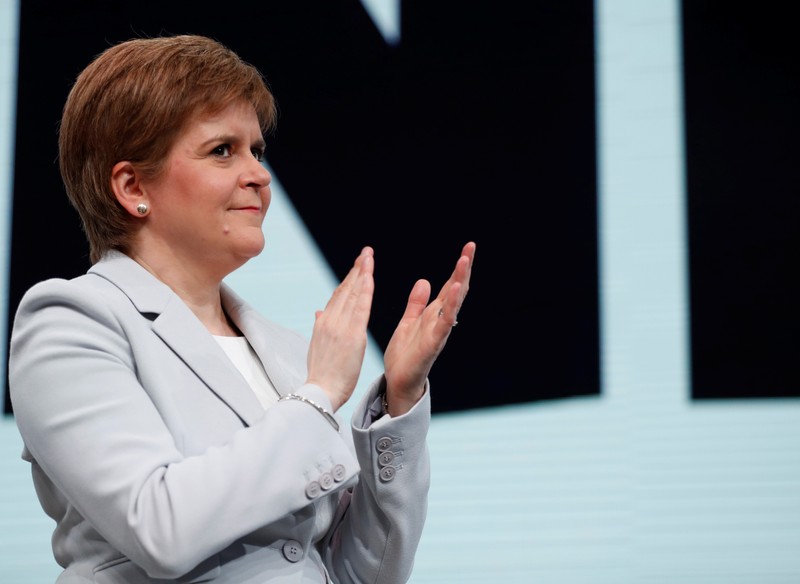
Scotland’s First Minister Nicola Sturgeon listens to John Swinney’s speech at the Scottish National Party (SNP) conference in Edinburgh, Scotland, Britain April 27, 2019. REUTERS/Russell Cheyne
May 29, 2019
By Elisabeth O’Leary
EDINBURGH (Reuters) – Scotland’s pro-independence government has set out new rules on referendums in the hope of holding another secession vote in the second half of 2020 if Britain’s parliament gives the go-ahead.
A bill presented to the devolved Scottish parliament on Wednesday aims to give clear ground rules that are legally watertight for any referendum vote.
In 2014, Scots rejected leaving their 300-year-old union with England and Wales by 55 to 45%. Polls say support for independence has grown since, but a majority still back the current UK political structure.
Results from last week’s European election, in which Nicola Sturgeon’s pro-EU Scottish National Party (SNP) increased its share of the vote to take three of six EU parliament seats assigned to Scotland, appear to have strengthened Sturgeon’s hand and show the antipathy to Brexit north of the English border.
Sturgeon’s government wants to give visibility and purpose to the discontent in Scotland over Britain’s exit from the European Union. That puts extra pressure on a UK government and parliament riven by political acrimony and unable to decide the shape of Brexit.
“Just published a bill to set the rules for an independence referendum – to allow the Scottish people to choose our own future rather than having a Brexit future imposed on us,” Sturgeon tweeted.
The bill prepares for a secession vote which the UK government says it will not allow. That position is untenable, Sturgeon argues.
“It is essential the UK government recognizes that it would be a democratic outrage if it seeks to block such a referendum – indeed, any such stance would, in my view, prove to be utterly unsustainable,” she said in a statement.
The bill does not set a date for a new independence vote but, speaking to the BBC in Dublin on Tuesday, Sturgeon said the latter half of next year would be the “right time.”
BREXIT FEEDING DISCONTENT
Theresa May has said she will step down as prime minister in June, opening a succession race in her party. For Scotland, any new prime minister aiming for a so-called hard Brexit will have to be aware of the risks of catalyzing the independence cause, said Professor Nicola McEwen of the University of Edinburgh.
“There is a sense that Brexit is happening despite the clear and consistent preference of the majority in Scotland, so the harder the Brexit the more stark that appears to be,” she said.
Many of the current candidates to replace May appear to be supporting a harder Brexit than that on offer.
“Politically I think that (a hard Brexit) does strengthen the case for independence, but economically and practically I think there are challenges,” McEwan said, adding that the possibility of a hard border between England and an independent Scotland would make the debate tougher for nationalists to win.
While the United Kingdom as a whole voted to leave the EU in a 2016 referendum, two of its four nations – Scotland and Northern Ireland – voted to stay, feeding political tension.
Nationalists say the Brexit watershed and the political chaos that has ensued mean Scots now deserve a new choice on the UK partnership, and accuse London of riding roughshod over Scotland’s views on post-Brexit economic relations.
May’s Conservative government says Scotland’s views have been heard, and that the nationalists want independence at any price.
(Editing by Stephen Addison and Stephen Powell)

